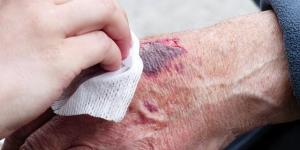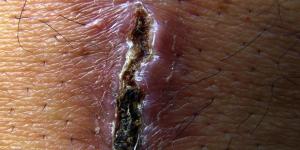How to Remove Glass from a Wound Safely


When a piece of glass is stuck in a wound, it can prove to be extremely painful. If you don’t remove the glass and treat the wound immediately, it can result in an infection. In the case of a piece of glass being stuck in a wound, we recommend removing it as soon as possible in order to avoid an allergic reaction or the spread of infection. If you believe that your wound might be infected and is really painful, we recommend consulting your doctor as soon as possible.
Removing the glass from the wound can help in immediate pain relief, specifically if you have to wait before going to the doctor. For this reason, here at OneHOWTO we will tell you how to safely remove glass from a wound at home, before going to the doctor.
How to remove glass from a wound
Here are a few methods you can try to remove glass from a wound:
- Tweezers: If a small part of the glass is protruding out of the wound, then you can easily grab it with tweezers and lightly pull it out. You will need to sterilize the tweezers by boiling them in water for 10 minutes. This will kill any bacteria that may be present on the tweezers. Allow the tweezers to cool down completely before you apply them onto your wound. Make sure that the tweezers are sharp and not too old and blunt. Pull the glass out in the same direction from where it entered. Make sure that you can clearly see the wound by sitting in a well-lighted place. Avoid applying too much pressure on the glass. Too much pressure can result in the glass breaking, which is what you want to avoid.Once you remove the glass, clean the area with running water and soap. If pain persists, seek medical attention.
- A needle: If the glass is completely embedded into your skin, then you won’t be able to grab it with tweezers. In this case, you will need to poke it out with a needle. Most importantly, don’t forget to clean the area with antiseptic solution like betadine or alcohol, so that you don’t end up catching an infection from the needle. Dip the needle in alcohol, iodine or hydrogen peroxide to disinfect it. Using the needle, dislodge the splinter gently and carefully. You might need to just dig a little bit. Once you see part of the glass protruding, you can drag it out using a pair of tweezers. Make sure to wash the area with water and soap and visit your doctor if pain or swelling worsens.
- Honey: Honey is a natural disinfectant, and luckily, it is sticky too. Apply some honey onto your wound and stick a band-aid on its top of it. When you remove the band-aid, the glass should come out sticking to the honey.
- Duct tape: First put some duct tape onto your cut, and then rip it off like a wax strip. The splinter, if clear enough, will stick to the tape and come out. You may need to repeat this same motion 4-5 times for results.
- Baking soda: Soaking the area in warm water and baking soda will loosen your skin. Mix one tsp of baking soda in one cup of warm water, and soak the wound in it. Keep soaked for around 10 minutes. This will usually loosen and soften the skin and should eventually cause the splinter to move to the surface. Then, we recommend lightly and gently applying a little pressure to the area to help the glass move up towards the skin surface. Then, use the needle or tweezers to help it come out.
- White vinegar: White vinegar contains 5% acetic acid solution and is also made up of antiseptic properties. Soak your wound in white vinegar for roughly 30 minutes, and then try to remove the glass using a pair of tweezers. Since the skin would have already become loose and soft, the splinter should come out by simply applying just a little bit of pressure.
- Epsom salts: Fill a bowl with warm water and add one cup of Epsom salts. Stir the solution until the salts completely dissolves in water. Place your affected area in water and let it soak for around 30 minutes. Your skin will swell a bit due to the heat, causing the glass to move up towards the surface. You can then drag the glass out using needle or tweezers.
- Castor oil: Castor oil is an excellent home remedy that can help remove piece of glass from your skin, as it naturally draws the splinter to your skin surface. Soak a cotton ball or gauze pad in sufficient castor oil and hold it onto the affected area. Let it soak for around 30 minutes, after which it will automatically come up to the surface.
- White glue: White glue tends to dry quickly and pull up everything that is stuck beneath it. This quality makes it a perfect ingredient to pull out stuck glass in your skin. Spread some white glue onto your skin just over the area where the glass is stuck. Once the glue dries completely, start peeling it off from the edges and work your way inwards. The glass should stick to the white glue and come out with the peel. Even if the glass is not completely removed, it will at least be pulled closer to the surface.
Once you have removed the glass from your wound, apply a gauze or bandage onto the area. Applying some antiseptic cream will be helpful in preventing any infection. If, however, you are not able to remove glass with any of these methods: visit your doctor to get it removed professionally. If you have removed the glass and you still feel pain or suspect infection, we recommend seeking medical help.

When to seek medical attention
Although small pieces of glass can usually be removed at home safely, there are certain circumstances when you need to seek medical attention. For example:
- If the glass is stuck under a fingernail, it will need to be removed with specific medical tools.
- If you notice: pus present, intolerable pain, swelling, redness and tenderness in the area, you will need to consult your veterinarian for proper treatment.
- If the glass piece is too large, it may affect your movement and sensation and may lead to blood vessel or nerve damage.
- If you have successfully removed the glass from your wound, but the area is still inflamed.
- If the patient is a child. Children have less tolerance to pain and may move a lot during the removal process. A doctor may use sedatives to help calm the child to remove the splinter.
- If you fail to remove the glass from your wound using any of these remedies, consult your doctor immediately.
This article is merely informative, oneHOWTO does not have the authority to prescribe any medical treatments or create a diagnosis. We invite you to visit your doctor if you have any type of condition or pain.
If you want to read similar articles to How to Remove Glass from a Wound Safely, we recommend you visit our Family health category.





